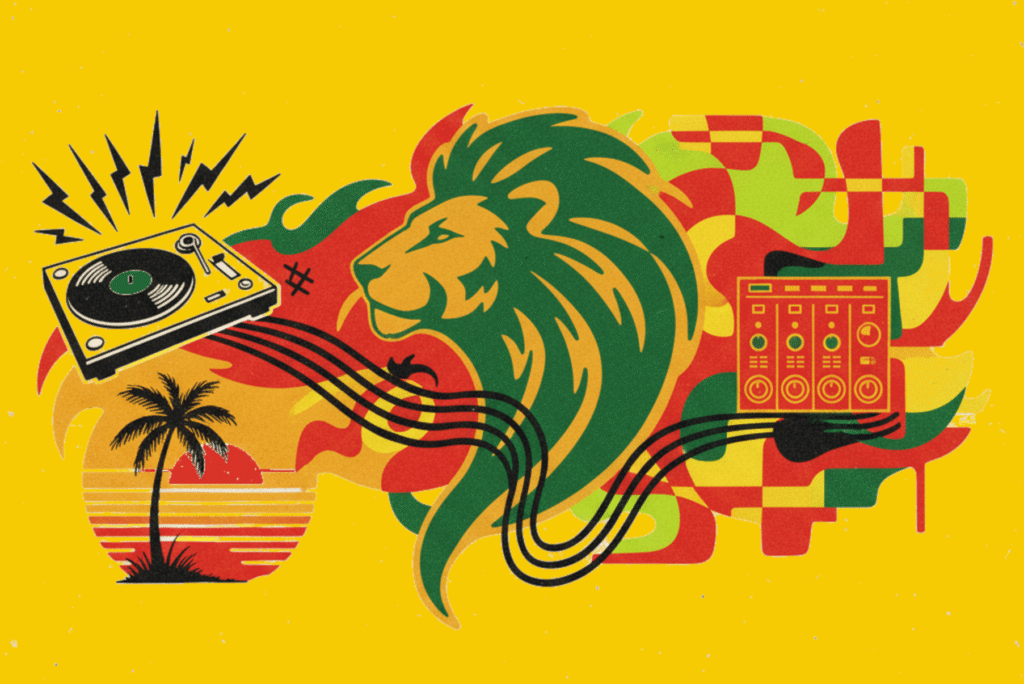Reggae is a music genre that originated in the Caribbean island of Jamaica in the late 1960s. It evolved from earlier musical styles like ska and rocksteady, and eventually developed different genres such as early and classic reggae, roots, lovers rock, dub, rockers and dancehall. Let’s find out the origins and evolution of reggae music.
Ska
Ska originated in Jamaica in the late 1950s, combining elements of Caribbean mento and calypso music with American jazz and rhythm & blues. In the early 1960s it became Jamaica’s dominant music genre and, following the island’s independence from Great Britain, it also became an international dance craze. Its unique sound is characterized by a walking bass line accented with rhythms on the offbeat.
>> Browse ska and oldies vinyl records.
Rocksteady
Around the mid-1960s, many ska musicians began to slow down their rhythms and beats, creating a new genre. Rocksteady is therefore a more relaxed version of Ska. The name comes from the slower dance style mentioned in the song called ‘Rocksteady’ by Alton Ellis. This period lasted a couple years, to then transition into the early Reggae era.
Early Reggae
This era started around 1968, when some Jamaican studio musicians were influenced by American funk music and experimented with different rhythmic patterns. The organ became a key instrument and more emphasis was put on the groove of the music. This sound is sometimes also referred to as “skinhead reggae” because of its popularity in the skinhead subculture in the UK during the late 1960s and early 1970s.
Classic Reggae
This covers the period around 1970 and 1974, when reggae had a less frantic pace and the guitar upbeats (known as ‘guitar skanks’) were simplified into a single stroke instead of being doubled up.
Roots Reggae
This is the type of reggae that most people are familiar with internationally. Between 1973 and 1980, Roots Reggae was characterized mainly by the lyrical themes on Rastafarian spirituality and social injustice; the belief in one living God, Jah, manifested as Ethiopia’s Emperor Haile Selassie; poverty and resistance to economic and racial oppression.
Roots Reggae has different musical characteristics, for example beats that range from the traditional one-drop style to the more rock influenced rockers and steppers styles. Drummers developed more complex kick drum patterns; simple chord progressions were often used to create a meditative feeling to complement the lyrics; and the bass became one of the most definitive features of reggae as a genre.
>> Browse roots reggae vinyl records.
Dub
Dub is about instrumental versions of reggae tracks that are stripped down and remixed as to create an entirely new tune, with particular emphasis on the drum and bass line to create an atmospheric and psychedelic quality. It was pioneered by King Tubby and Lee Perry in the 1960s and 1970s.
Rockers
Rockers Reggae, originated in the mid-1970s, refers to what can be described as a more mechanical and aggressive style of playing roots reggae with a greater use of syncopated drum patterns.
Lovers Rock
It originated in London in the mid-1970s with lyrics usually about love and beats for slow dancing.
DJ Style: Rub-A-Dub & Dancehall
In Jamaican music, a deejay (DJ) is a musician who sings and “toasts” to an instrumental riddim. Toasting or deejaying is the act of talking or chanting, usually in a monotone melody, over a rhythm or beat by a deejay. Rub-A-Dub is one the genres doing the passage between Reggae and Dancehall. It emerged in the late 1970s and early 1980s.
Dancehall developed when digital instrumentation became more prevalent. It is characterized by a tough style with very heavy bass, the focus on track instrumentals (riddims) and on the vocalist, and the extensive use of Jamaican Patois rather than Jamaican standard English.
>> Browse deejay and rub-a-dub vinyl records.
If you are looking for a record in particular or need any suggestions, email us at hello@enkismusicrecords.com

